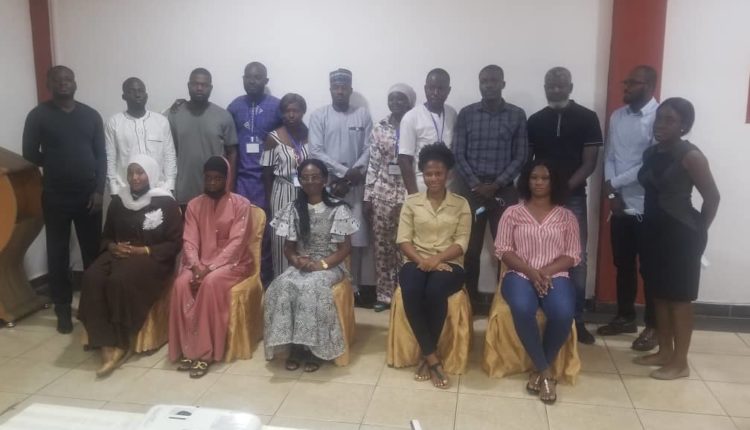The Ashesi youth peacebuilding project held four months ago seeking to promote peace and sustainability, development in addition to better mediation coordination has ran a feedback session on the achievements of the initiative.
The event, which was split over two days, saw youth leaders selected from youth organizations, churches, mosques, and educational institutions including Assemblymen and women from some communities; the second day also saw queen mothers trained on enhancing capacity to prevent disputes in their respective communities.
The event, funded by Ashesi University, is aimed at effecting social change in Ghana by building the capacities of young people and equipping them with skills necessary to be agents of positive change to enhance development.
On the first day of the event which happened on November 30, 2021at the Paloma Hotel, Ring Road, near Nima Police Station, the youth leaders shared their respective benefits and lessons learned during the program.
In addition, they shared their success stories and challenges encountered during their practice on the field as well as the gathering of data to improve efficiency of the program in other regions of the country.
Also, the youth peacebuilders were introduced to step-by-step mediation to better equip them in conflict prevention and resolution in various group presentation.
On the second day, the queen mothers were introduced to Court Connected ADR – specifically mediation so to enable them handle court cases that can be resolved through mediation and by so doing, contribute towards the decongestion of the courts.
Mr. Alex Nartey, National ADR Cordinator of the Judicial Service introduced the queen mothers to the skill gap of ineffective dispute resolution for sustainable development.
According to him, the move is necessary so to equip the queen mothers to enable them to effectively play their roles in dispute prevention and resolution.
“ADR mediation is necessary in our community, reason I decided to partner with Ashesi peacebuilders’ project so to teach our mothers on the need for such intervention and the queen mothers are the best ones for such training. They need it so to enable them engage their respective community members on it, and enable to prevent the rising of conflicts and other unwarranted issues” he said.
A lecturer at the University, ADR expert and the event organizer, Dr. Enyonam Canice Kudonoo, in an interview with The New Publisher said the feedback session is meant to promote peaceful co-existence through the effective prevention and resolution of disputes in Ghana for sustainable development.
“Traditional conflicts (chieftaincy conflicts) inhibit the development of communities in the country including the Greater Accra Region. For instance, traditional leaders in the Greater Accra Region are not able to manage disputes satisfactorily. Information obtained from communities in the region indicates that there are numerous unresolved chieftaincy issues, and land-related disputes, which if not effectively addressed could lead to overt efforts to destroy one another and infrastructure.
“As a result, this program was designed for queen mothers to equip them to bridge the skill gap of ineffective dispute resolution (mediation) for sustainable development. Queen mothers are repositories of knowledge and wisdom; therefore, complicated issues are often referred to them for resolution. Thus, the concept of: “yenkobisa abrewa tia” meaning, “let us seek counseling from the old lady” evolved and persists. Accordingly, the need to equip them with the requisite skills in dispute prevention/resolution (mediation) cannot be overemphasized. An element of entrepreneurship is factored in the design of the program, where they will learn how to start and manage their individual ADR centers to earn income from their dispute resolution services. Thus, Queen Mothers will be profitably engaged while they also render services of peacemaking in their communities.”
On the side of the youth leaders, she explained “the exuberance of the youth makes them capable of achieving great results that lead to sustainable development if channeled in a positive direction. The nation is facing problems in the form of youth, unemployment, chieftaincy disputes, discrimination, stereotyping, and other resource-based disputes among many others where the youth are greatly affected and wrongly used to inhibit progress by conflict kingpins in the country. Most of such youths end up engaging in all forms of social vices. As a result, many of them are imprisoned or die due to their inability to handle dispute situations.
“The youth peacebuilders program, therefore, focuses on a cross-section of youth leaders. The program is expected to engage as many youth leaders as possible selected from youth organizations, churches, mosques, and educational institutions including Assemblymen and women from some communities. Selected youth leaders will be sensitized on the importance of dialogue for dispute prevention that leads to peaceful co-existence and sustainable development in the region. The program lays emphasis on key principles in dialogue (listening, respecting, suspending, voicing, and transparency) that promotes non-violence (positive) and consensus-building for dispute prevention, among others. The capacity building program will pay attention to areas concerning: Citizenship, Effective Communication, Leadership, Curiosity and Skill.”


Comments are closed.